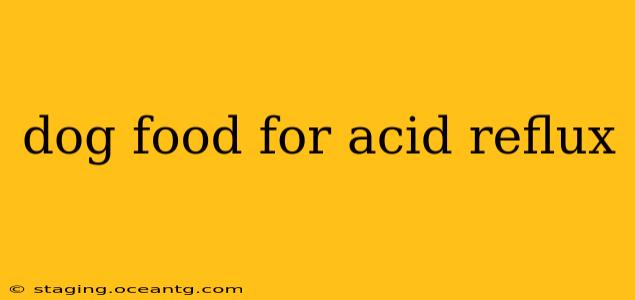Acid reflux, also known as gastroesophageal reflux disease (GERD) in humans, is a common digestive problem that can also affect our canine companions. It occurs when stomach acid flows back up into the esophagus, causing irritation and discomfort. While a vet diagnosis is crucial, choosing the right dog food can significantly help manage symptoms. This comprehensive guide explores the best types of dog food for acid reflux and answers frequently asked questions.
What Causes Acid Reflux in Dogs?
Several factors can contribute to acid reflux in dogs. These include:
- Dietary indiscretions: Eating too quickly, consuming large meals, or indulging in rich, fatty foods can all trigger acid reflux.
- Obesity: Excess weight puts pressure on the stomach, increasing the likelihood of acid reflux.
- Hiatal hernia: This condition, where a portion of the stomach protrudes through the diaphragm, can lead to acid reflux.
- Certain medications: Some medications can have acid reflux as a side effect.
- Underlying medical conditions: Conditions like pancreatitis or inflammatory bowel disease (IBD) can exacerbate acid reflux.
It's crucial to note: This information is for educational purposes only and does not constitute veterinary advice. Always consult your veterinarian for a proper diagnosis and treatment plan for your dog's acid reflux.
What Kind of Dog Food is Best for Acid Reflux?
The ideal dog food for acid reflux focuses on minimizing stomach acid production and promoting gentle digestion. Key characteristics to look for include:
- Low fat content: High-fat foods can relax the lower esophageal sphincter, allowing stomach acid to reflux more easily.
- High fiber: Fiber adds bulk to the stool, promoting regular bowel movements and reducing the pressure on the stomach.
- Easily digestible proteins: Opt for high-quality, easily digestible protein sources like chicken, turkey, or lamb. Avoid fillers and by-products.
- Limited ingredients: Foods with fewer ingredients minimize the risk of allergic reactions or sensitivities that might worsen acid reflux.
- Small kibble size: Smaller kibble encourages slower eating, reducing the likelihood of regurgitation and acid reflux.
What are the Benefits of a Prescription Diet for Acid Reflux in Dogs?
Veterinarians often recommend prescription diets for managing canine acid reflux. These diets are specifically formulated to address the underlying causes and symptoms, often containing:
- Reduced acidity: Formulated to neutralize stomach acid and soothe the irritated esophagus.
- Prebiotics and probiotics: These support a healthy gut microbiome, improving digestion and reducing inflammation.
- Specific protein sources: These may include hydrolyzed proteins, which are easier to digest.
It's essential to only obtain prescription diets from your veterinarian. They can tailor the diet to your dog's specific needs and monitor its effectiveness.
Can Homemade Dog Food Help with Acid Reflux?
While homemade dog food can be beneficial, it requires careful planning and consultation with your veterinarian or a veterinary nutritionist. A balanced homemade diet must provide all the essential nutrients your dog needs. Improperly balanced homemade food can lead to nutritional deficiencies. Your vet can help you create a recipe that addresses your dog's acid reflux while meeting its nutritional needs.
What Human Foods Should I Avoid Giving My Dog with Acid Reflux?
Many human foods can exacerbate acid reflux in dogs. Avoid feeding your dog:
- Fatty or greasy foods: These include fried foods, bacon, and many processed snacks.
- Spicy foods: Spices can irritate the stomach lining.
- Chocolate: This is toxic to dogs and can worsen digestive issues.
- Onions and garlic: These are toxic to dogs.
- Caffeinated beverages: These can increase stomach acid production.
What are Some Other Ways to Manage My Dog's Acid Reflux?
Besides diet, other measures can help manage your dog's acid reflux:
- Elevated food bowls: Raising the food bowl can help prevent acid reflux by reducing pressure on the stomach.
- Smaller, more frequent meals: Smaller meals reduce the workload on the digestive system.
- Weight management: Maintaining a healthy weight is crucial for reducing the pressure on the stomach.
- Avoid strenuous activity after meals: This allows for better digestion.
- Stress reduction: Stress can worsen digestive problems; provide a calm and comfortable environment.
By combining the right diet with other management strategies, you can significantly improve your dog's comfort and quality of life. Remember, always consult your veterinarian for a proper diagnosis and personalized treatment plan for your dog's acid reflux.
